#anne of windy willows
Text
"The public and the publisher won't allow me to write of a girl how she really is... you have to depict this sweet, inspired young thing – really a child grown older – to whom the basic realities of life and reactions to them are quite unknown. LOVE must scarcely be hinted at – yet – girls often have some very livid love affairs."
— Lucy Maud Montgomery, the Selected Journals of, year 1924
Posted because inevitably and invariably anytime I search the ‘Windy Poplars’ tag here (or on other media; I’m making direct eye contact with you, GoodReads), there’s a little misconception floating around that Maud wanted or chose to censor Anne and Gilbert’s letters. But! It’s actually rather the opposite. She wanted that romance illustrated, she felt it was appropriate and natural. It was her publishers that insisted that the novels remain as benign as possible… despite the obvious; that Anne and Gilbert endured a long separated engagement and then went on to have seven whole children.
#that annoying ellipsis#let’s clear the air here#anne of windy poplars#anne of windy willows#lucy maud montgomery#anne shirley#anne of green gables
79 notes
·
View notes
Quote
It was rather a nice little room, a bit cluttered up with antimacassars but with a quiet, friendly atmosphere about it that I liked. Every bit of furniture had its own particular place which it had occupied for years. How that furniture shone! No bought polish ever produced that mirror-like gloss. I knew it was Rebecca Dew's elbow grease. There was a full-rigged ship in a bottle on the mantelpiece which interested Mrs. Lynde greatly. She couldn't imagine how it ever got into the bottle...but she thought it gave the room 'a nautical air.'
Anne of Windy WIllows, Lucy Maud Montgomery
#Anne of Windy Willows#Lucy Maud Montgomery#fictional home#fictional homes#urban home#urban homes#Windy Willows
8 notes
·
View notes
Text
Elizabeth grayson is such a good character pls
2 notes
·
View notes
Quote
Personne n’est jamais trop vieux pour rêver. Et les rêves ne vieillissent jamais.
Lucy Maud Montgomery, Anne de Windy Willows
English : Nobody is ever too old to dream. And dreams never grow old.
#Lucy Maud Montgomery#Anne de Windy Willows#livre#livres#book#books#citation francaise#citation en français#citation#littérature#littérature canadienne#literature#littérature jeunesse#quote#quotes#english quote#english literature
72 notes
·
View notes
Text
Anne de Windy Willows, Lucy Maud Montgomery
J’ai continué la série Anne de Monsieur Toussaint Louverture, et j’ai adoré ! (Attention petits spoilers du tome 3)
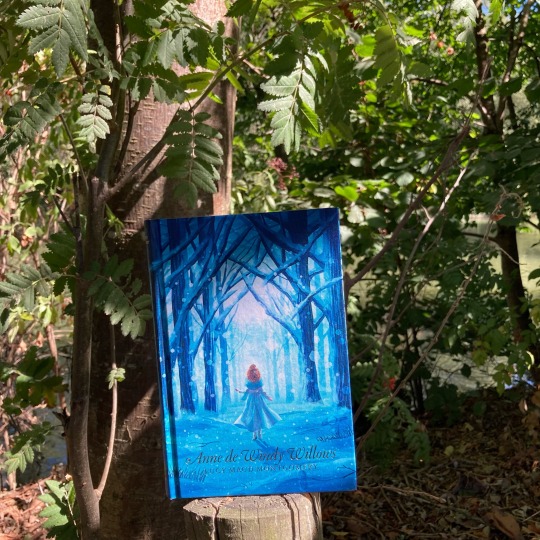
Anne est désormais licenciée de Lettres et enseigne au lycée de Summerside. Elle est fiancée à Gilbert ♡ Ce quatrième tome est un peu différent des autres, notamment de part sa forme épistolaire. On y lit uniquement des lettres qu’Anne écrit à Gilbert — même s’il y a aussi quelques chapitres de roman.
Comme d’habitude, Anne est pleine de vie et de poésie, et ça fait du bien ! Lorsqu’elle prend son poste, elle a du mal avec tout un clan qui règne sur la ville (la famille Pringle) et qui lui rend la vie impossible. Mais elle va réussir à les dompter !
On suit Anne pendant trois ans. Elle devient de plus en plus adulte et mature ; les gens se tournent vers elle, elle aide beaucoup de personnes, mais reste poétique et rêveuse comme on l’aime !
J’ai bien aimé ce tome, très différent des autres. Il y a tout un tas de petites intrigues, une grosse par année, et ensuite plein de petites intrigues au milieu des plus grandes. (J’espère que c’est clair !) Cette série est comme un petit bonbon dont on ne se lasse pas ! C’est toujours tout doux et lumineux, et j’ai hâte de découvrir le cinquième tome !
09/08/2022 - 10/08/2022
#livres#books#livre#book#littérature#littérature américaine#monsieur toussaint louverture#anne de green gables#anne de windy willows#anne of windy poplars#lucy maud montgomery
1 note
·
View note
Text

J’aime m’asseoir là et écouter le silence. As-tu déjà remarqué qu’il en existe de toutes sortes....Le silence de la forêt, le silence de la plage, celui des prés, de la nuit, d’une après-midi d’été. Tous différents, car les nuances qui composent leur trame le sont.
Lucy Maud Montgomery- (Anne de Windy Willows)
37 notes
·
View notes
Text
Anne of Green Gables: The first impressions of someone reading the series for the first time in 2024.
To start this off, I'm just going to preface it with this is not going to be an academic/professional essay. Realistically it'll be closer to dotpoints and free flowing thoughts that jump around the place. It is also not official or objective or anything else, just my thoughts and feelings. Argue with the wall if you disagree lmao. I will also note that nowadays I am primarily a non fiction reader and that it's been long since this has been my genre of choice, but I had all the books on my shelf and want to read everything on my shelf at least once lmao. I went into this series with a vague idea of the plot around the first novel and knew that Gilbert and Anne ended up together, but that's it. I also read the books in Anne's age order, which, according to Wikipedia, was:
Anne of Green Gables
Anne of Avonlea
Chronicles of Avonlea
Further Chronicles of Avonlea
Anne of the Island
Anne of Windy Willows (yes I am Australian so I own this as opposed to Windy Poplars)
Anne's House of Dreams
Anne of Ingleside
Rainbow Valley
Rilla of Ingleside
The Blythes Are Quoted
So I guess a good place to start off my thoughts is to note the obvious: This was not the release order of these books. And that is super interesting to me.
Firstly, I want to applaud Lucy because I feel like often times when writers write a novel in a series in which the new novel happens chronologically before ones that came before it, it is made clear in a bad way that that's the case. However, had I not known this was not the chronological order beforehand, I never would have questioned it while reading. It also makes me want to talk to someone who was a fan of these books as they were being released and ask them what they thought about the books coming out in that order then. However, I am well aware that most if not all people in the world who fit that category have unfortunately passed on by now.
Secondly, I think this is particularly interesting in regards to Rilla of Ingleside and the two books that followed within Lucy's lifetime. I don't think I need to explain to anyone who has read the books that there is a massive tone change in Rilla of Ingleside comparative to all of the other books (barring the poetry in The Blythes Are Quoted) within the series. Given the timing of the books that followed, it would make sense to me that war was on Lucy's mind; that the war to end all wars did not in fact end all wars. It would have made sense to write a Rilla of Ingleside 2 exploring that given the circumstances, and yet she went back to Anne and comparatively happier times within the Anne of Green Gables universe. I am neither saying that is the wrong or right choice, just that it is very interesting to me. I do know that Lucy died before the war ended, so perhaps had she lived longer, she would have knowing that the allies won, but we'll never know and again, I find that very interesting.
As for my enjoyment of the books themselves, I think that with the exception of Rilla of Ingleside (which is a top 3 book of the series for me), there's a reason why the series revolves around Anne. I think she is the star of the show and I found that I enjoyed the books that heavily featured her far more than the ones that did not. I would say this to the point where if I were to reread the series, I would read any of the books starting with “Anne of” and Rilla of Ingleside and leave the rest, and to be honest, I would probably recommend that to any of my friends who haven't read the series if they felt they didn't vibe with the side characters in the first two books.
What I do appreciate the side books for is how they show that, intentionally or not, there is narrative bias and unreliable narration in the other books when it comes to how the Blythes are perceived. Throughout the Anne books, I always got the impression that while yes, people did see Anne as weird, most people came around and ended up befriending her or at least otherwise seeing her positively and that Gilbert was mostly liked. However, on top of The Blythes Are Quoted flat out saying that Anne was not liked by many, I found it interesting that a lot of the books from other points of view really showed Anne to be an annoying gossip to a lot of people and Gilbert to be quite harsh; even to the point of abuse rumours. Even in Rilla of Ingleside, we see Gilbert putting his foot down with Rilla about her responsibility in keeping the child in a way that I'd argue we don't with his interactions with Anne. The closest we get to that is the end of Anne of Ingleside where he is that overtired and embarrassed that his gift for Anne did not come on time that it came off to Anne as apathy. From memory, most to all other occasions in regards to Anne show him as stubborn but ultimately very caring and right. This difference in perception fills out the world and makes it feel a little more real, which I appreciate.
My main takeaway from this series, and I think a highlight of it, is to look at it from a lens of 'How is this different than the society I live in now?'. And the honest truth is is that it's not as different as I was expecting. There are a lot of ideas and plots in these books that are very progressive; even in 2024. Like let's be real, comparatively, there are not a lot of books that deal with miscarriages, women in higher education, the themes of love explored (marrying for love vs money, whether someone coming back for you after being separated for years/after their partner died is romantic or being a second option etc) and the impact of war on those of us left behind (whether that's veterans or those who could not fight in the first place). I was particularly struck with the comment Anne makes in The Blythes Are Quoted implying that Walter likely would have killed himself had he survived the war and Jem implying that he himself was struggling despite not being as openly vulnerable as Walter was. And I imagine there was even less of these themes in books a century ago. Likewise, I found it interesting that Lucy did not play into the idea of the older generation automatically having it worse when she made the choice to have the Blythe children grow up in the war era. As I have mentioned, Rilla of Ingleside was far different and darker in tone than the other books (again barring the poetry from The Blythes Are Quoted) and it's such an interesting choice to make given that even to this day there is a sentiment that each generation automatically has it better than the last purely because their parents (rightfully) want them to have it better than they did.
In saying all of this, the progressive nature of a lot of these books just made the conservative/traditional choices all the more obvious and harder to swallow for me. The non Anne/Rilla books are the worst offenders for me (and likely the main reason I did not enjoy them as much as the Anne/Rilla books). Like obviously there are sign of the time differences that were interesting to me (lack of Diana/Marilla, even in mentions, in the later books despite Anne naming children after them due to travelling being less common and more time consuming back then etc) but then there were also a lot of times where I found myself reminding myself that these values were the norm when these books were written. The obvious culprit was the racial language used, but I also did find myself cringing at how anti psychology it could be at times (mostly to make spanking feel like the 'correct' option which is still unfortunately common in some areas) and making jokes to my friends about how I was about to bring out my inner Ms Trunchbull over how marriage was treated in the books. From having women apologise for having boundaries/emotions to marriage being seen as the goal in life, even if it's in the worst circumstances, to Anne primarily being known as “Mrs Blythe” or “Mrs Dr” the second she got married really stood out to me and were things I had to contextualise in order to be able to finish the series. I also want to note that this is the first book/series I've read that Lucy wrote and I have been told that a lot of her other works were not conservative/traditional in the same way which is interesting to me. I do wonder if a lot of it had to do with this being her best seller so choices being made that would appeal to the masses of the time. Outside of the books themselves, it did also remind me that there are books that are being written now that we see as progressive that our grandchildren will see in a whole different light, and made me appreciate how far society has come in that regard.
I don't have much to say about the books individually... barring Rilla of Ingleside of course. I recognise that this is the third time I am saying this, but the absolute change of tone and themes in Rilla of Ingleside makes it by far the most interesting of the books in this series for me. I remember feeling a bit gobsmacked the moment I realised it was going to be a war book. And then my heart sunk. Because, in that moment, I remembered Walter Blythe and the fact that I thought something horrible was going to happen to him the minute he got into that fight in an earlier book. I knew in that moment what was to come, and that it would make sense for it all to turn out like it did, but god did I hope I was wrong. Throughout the books they were part of, Jem was my favourite of the Blythe children, but as a super sensitive person myself, I have a very special spot for Walter in my heart and think that his arc is the best put together out of the Blythe children. Also as a side note, God is having Jem find out about Walter's death so much after everyone else a choice, and one that will live rent free in my mind forever; especially because we do not get to see him grieve as we do the others.
Outside of Walter though, I find it interesting and the correct choice that this story happens through Rilla; the spoiled, vain, somewhat selfish youngest child at that prime age between childhood and adulthood. And especially with her and Walter seemingly being the closest out of the Blythe children, it tells a story that I don't know could have been told by any other character; even Anne. I also think that having this tale be told from someone who was not actively fighting in the war feels both progressive in that it's a story that is less often told (especially in the perception of it being just as important as those fighting) but aged well in many ways while still being dated/a sign of the times. Lucy did not live to see a world where the horrors of war were broadcast to the everyday people (though it was made clear that WW1 was different than past wars, the Vietnam war was the first time what happened on the battlefield was televised/shown to the masses), so it makes sense that not only is Jem 'cheerier' (for lack of a better word) about his prisoner of war days than what would actually be expected, but that a large part of Rilla's role is promoting the war and pushing for others to enlist despite her feelings about her brothers enlisting.
However, where this book has aged particularly well, and perhaps may even feel more resonate to the current generation than Anne's books for it, is its commentary on waiting during a traumatic time and feeling like nothing and everything has changed simultaneously. Many of the things said about the characters feelings regarding the war, and particularly those not fighting, were very reminiscent of things my friends who had not experienced trauma said about the coronavirus era we are living in. They also reminded me of an analogy to war an ex professor of mine made during the height of coronavirus about how those not fighting ached for a time where dancing and fun would prevail while those fighting could not find it in themselves to be that and were traumatised into a far more serious personality. Perhaps this is why I find myself wishing that we got to see more of Jem post war, but the aforementioned conversation between him and Anne in The Blythes Are Quoted in regards to Walter and Jem's war trauma gave me that same feeling.
To end this off, I want to respond to a question that I've been asked and seen others be asked about this series. Is this a children's series? Ultimately I would say yes. I was reading very similar things from the ages of 8 and above. Does that mean that it is only a children's series though? No. Had I read this series in 2003 when I was 8, I do not think I would have picked up on and resonated with at least half of the things I have spoken about in post. Instead, my main takeaways would have been about how love is not always what you think it will be or where you think you will find it and that change is a part of life, as is grief, but so is love and beauty and that they will always come back, even at the darkest of times. And I think those takeaways are just as important as the ones that I have spoken about here. It is simply that I got those takeaways from other experiences in life before I got around to reading this series. And I think that is the beauty of this series. It is by far one of the most interesting fiction series I've read in a while and really has something for most people in my opinion. Though it undoubtedly would not be the exact same story if written now, the fact that it has remained a classic over 100 years since the first book was released demonstrates that more than anything I could say would. And as someone who is writing a novel themselves at the moment, I applaud Lucy for that because god knows that is not easy to do.
#anne of green gables#rilla of ingleside#under a read more because it's long but yeah for anyone interested these are my thoughts. I'm sure i missed something but oh well
2 notes
·
View notes
Text
pro tips: anne of windy willows is not the book to read if you are having emotions about friends getting married
#there is far too much being engaged in it#anne of avonlea is goign pretty well though#rowena adventures
3 notes
·
View notes
Text
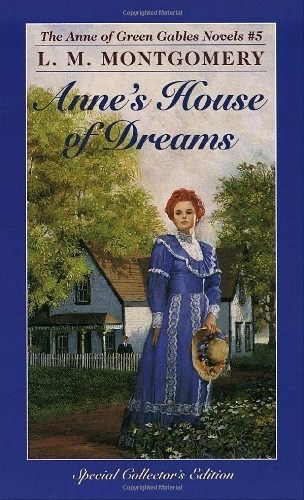
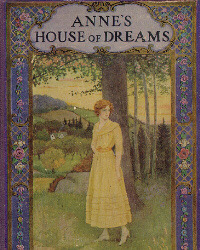
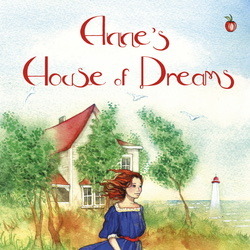
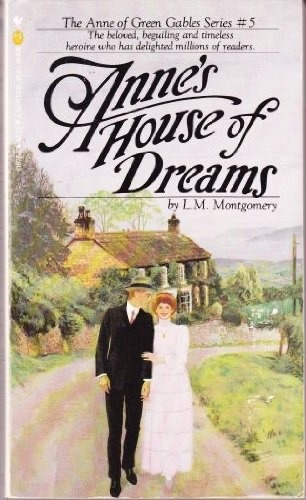
I really flew through the fourth book of the Anne of Green Gables — Anne of Windy Poplars, which was originally published as Anne of Windy Willows in the UK and Australia — and am now on to the fifth — Anne’s House of Dreams.
This is also where the publication order starts to get messed up compared to the chronology of the story. In terms of publication order, Anne’s House of Dreams actually comes before Anne of Windy Poplars.
4 notes
·
View notes
Note
Anne !
This is in reference to this post.
❤ Favorite Male: Gilbert, naturally.
❤ Favorite Female: Am ... am I too basic if I say Anne? I also adore Phil and the rest of the Patty's Place gang.
❤ Favorite Pairing: Anne/Gilbert, of course, but honourable mentions go to Phil/Jo, Leslie/Owen and John/Rosemary.
❤ Least Favorite Character: the oppressive Mrs Gibson (from Anne of Windy Willows), who stifled poor Pauline for so long. Or, Gilbert's Aunt Mary Maria.
❤ who’s most like me: Faith Meredith.
❤ most attractive: three-way tie between Faith, Nan and Phil (female), or Gilbert or Walter (male). Personally, if I were in that universe I would probably find Jem irresistible...
❤ three more characters that I like: Katherine, Diana and Miss Cornelia.
Thanks for the ask!
2 notes
·
View notes
Text
“Belovedest.”
Anne Shirley of/to Gilbert Blythe, Anne of Windy Willows, Lucy Maud Montgomery
#gilbert indulges in the excercise of giving anne a whole series of quite charming nicknames and endearments#anne is concise but equally as sweet with hers#this is used on/to no one else by anne in all seven books#and appears to only be used privately#lifted from an ancient letter from one great old lady to her own dear husband#gilbert blythe#anne shirley#lucy maud montgomery#anne of windy willows#or is it#anne of windy poplars
46 notes
·
View notes
Note
1 and 17 for the end of the year book asks! Bonnes fêtes de fin d'année à toi :)
Bonjour et merci pour les questions :) Bonne fin d’année à toi aussi !
How many books did you read this year?
Pour l'instant 241 si l'on en croit mes statistiques sur Goodreads (pour être honnête il y a aussi un certain nombre de titres graphiques dans le lot, ce qui a rendu plus facile le fait d'arriver à ce chiffre). Mais je compte en lire quelques autres avant la fin de l'année, d'autant que j'en ai reçu pour Noël.
17. Top five books of the year
-Anne de Green Gables (et les autres livres de la série jusqu'à Anne de Windy Willows) de Lucy Maude Montgomery. C'est vraiment une lecture douce et reposante par excellente. L'héroïne et les personnages qui l'entourent sont très attachants, les descriptions de la nature sont superbes et l'histoire garde toujours un fond optimiste malgré les difficultés (j'ai d'ailleurs été très surprise par la différence de ton entre l'oeuvre originale et l'adaptation Anne with an E).
-They never learn, Layne Fargo : un livre avec un côté jouissif assumé dans sa dénonciation des violences envers les femmes et son exploration de la colère féminine.
-Artémise, Violaine Sebillotte Cuchet : on sort de la fiction cette fois. Artémise Iere de Carie est un de mes personnages historiques préférées, donc j'étais ravie de trouver un livre aussi complet sur elle. Lequel s'attache aussi à la replacer dans son contexte et à couvrir d'autres exemples de femmes puissantes.
-La bibliothèque des rêves secrets, Michiko Aoyama : une vraie lecture feel-good pleine de bienveillance, avec différents personnages dont les histoires vont se croiser.
-Kim Jiyoung née en 1982, Cho Nam-Joo : un livre sur la Corée du Sud mais qui dont le propos est universel et qui décortique avec beaucoup de justesse toute l'influence d'un système sexiste sur dans le vie d'une femme.
End of the year book asks
2 notes
·
View notes
Quote
Mais le problème c’est qu’il n’y a pas de tournants, sur mon chemin à moi. Je le vois s’étirer droit devant jusqu’à l’horizon, d’une monotonie sans fin. Oh, la vie ne vous effraie donc jamais, Anne, tant elle est vide, tant elle grouille de gens froids, inintéressants ?
Lucy Maud Montgomery, Anne de Windy Willows
English : But the trouble is there aren't any bends in my road. I can see it stretching straight out before me to the sky-line…endless monotony. Oh, does life ever frighten you, Anne, with its blankness…its swarms of cold, uninteresting people?
#Lucy Maud Montgomery#Anne de Windy Willows#livre#livres#book#citation#citation française#citation en français#littérature#littérature canadienne#literature#quote#quotes#english quote#english literature
54 notes
·
View notes
Text
Anne d’Ingleside, Lucy Maud Montgomery
Après la violence du Diable en personne, il me fallait du doux, du léger, du doudou ! Et quoi de mieux qu’Anne pour ça ?

Je suis quasiment à jour dans la série, on y croit ! Après avoir été Anne de Green Gables, Anne d’Avonlea, Anne de Redmond, Anne de Windy Willows et Anne de la maison de rêve, Anne est maintenant Anne d’Ingleside… et mère de 6 (!) enfants : Walter, Jem, les jumelles Nan et Di, Shirley, et Rilla. Chacun.e semble avoir hérité des dons de leur mère, entre imagination débordante, fantaisie et poésie.
Ce tome-ci est très différent des autres. Davantage de personnages, beaucoup de petites histoires, et pas forcément une longue intrigue étalée sur 300 pages. On retrouve toujours (quoi qu’un peu moins) la merveilleuse Anne, qui arrive à voir la beauté du monde dans toutes les petites choses du commun qui passent inaperçues chez les autres. J’ai bien aimé, même si j’ai trouvé que c’était parfois un peu long, et que ça me manquait de ne pas avoir plus d’Anne. Elle a grandi, elle et Gilbert sont mariés depuis 15 ans.
« Les mères étaient les mêmes de siècle en siècle, une grande sororité d’amour et de dévouement, qu’on se souvienne d’elles ou qu’on les ait oubliées. » C’est un tome sur la maternité, sur le fait qu’Anne soit là pour ses enfants, qu’elle les prenne au sérieux alors qu’à l’époque ce n’était pas forcément le cas (puisque comme cette chère Tante Mary Maria (non) l’a si bien dit, quand elle était enfant il fallait être vu mais pas entendu…). À un moment, Anne parle des petites peines de cœur et tourments qui semblent, en gros, futiles pour les adultes mais qui représentent une montagne pour les enfants, et c’est très beau. Pour mon grand bonheur, le dernier chapitre nous offre une jolie scène entre Anne et Gilbert, mais j’ai trouvé que ça avait beaucoup manqué dans ce tome — Gilbert est sollicité de partout en sa qualité de médecin, et souvent absent. J’ai hâte de lire La Vallée Arc-en-ciel et Rilla, ma Rilla, les deux derniers (et très triste d’avoir bientôt fini) de la saga !
22/07/2023 - 24/07/2023
#livres#books#livre#book#littérature#littérature jeunesse#littérature canadienne#anne d’ingleside#anne of ingleside#anne of green gables#lucy maud montgomery#monsieur toussaint louverture
0 notes
Text
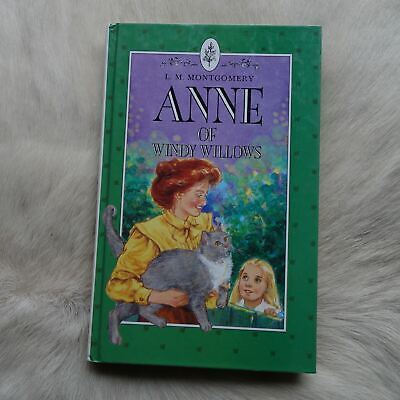
Vtg L.M. Montgomery ANNE OF WINDY WILLOWS 1990 Vtg Anne of Green Gables 4
0 notes